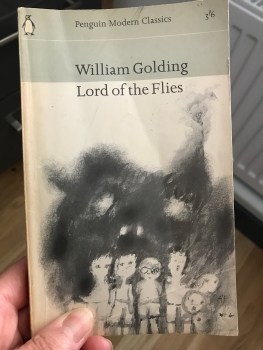When I announced that this book was May’s choice for my Facebook reading challenge (theme, a 20th century classic), there were mixed feelings – it seems a few of our participants had studied it at school for their ‘O’ level English Literature (predecessor to the GCSE for anyone young enough not to know!). Some were delighted…others less so! I did not study this at school, but I read it at University (I did an English degree). My childhood home was not one filled with books, though I spent a great deal of time at my local library, so when I went to University I had a lot of catching up to do on many of the classics. Golding’s book is one of those and is widely considered to be one of the all-time great novels.

Lord of the Flies was Golding’s first novel, published in 1954. I doubt many people could name any of his other works (I couldn’t!), although he won the Booker Prize in 1980 for his novel Rites of Passage, and the Nobel Prize for Literature in 1983. He died in 1993 at the age of 81. Lord of the Flies has been adapted three times for the big screen, and several times for stage and radio.
The basic plot is that a group of boys (thought to number about thirty, but it’s not entirely clear) are marooned on a Pacific island following a wartime evacuation attempt that ends in a plane crash. There are no adult survivors and the boys, ranging in age from perhaps nine to thirteen years, must learn quickly to survive. Three main characters emerge: Ralph and Jack are the two alpha-males of the group, but have very different instincts about the priorities, and Piggy, an overweight, severely near-sighted boy, probably of lower class than Ralph and Jack, who proves to be the most thoughtful, sensible and self-aware but who lacks the leadership skills to wield any power.
Initially, the boys attempt to organise, with Ralph at the helm. His primary concern is that they should get rescued and stay alive and safe until then. He meets resistance in the form of Jack, who is less keen on the rules and disciplines that Ralph wants to impose. His priorities are “fun” and hunting animals so that they can eat meat. As the days and weeks pass morale drops, particularly among the younger boys, many of whom are clearly terrified. They fear the darkness and the heavy forest on the island and what may be lurking within it – they imagine a terrible beast. Order begins to break down and powerful instincts surface. There is a terrible power struggle between Jack and Ralph which intensifies as the novel progresses. Factions form around the two leaders and the behaviours become increasingly reckless. Simon, one of the other older boys, and a sensitive soul, is killed in a case of mistaken identity, the now savage and adrenalin-fuelled group around Jack believing in his night-time approach to the camp, that he is in fact the much-feared “beast” they imagine stalks them.
Simon’s death at the hands of those who were once his schoolmates, unleashes further savagery, like the genie is out of the bottle. There is also, however, a kind of denial; it seems only Piggy recognises and is able to articulate the danger they are in – from themselves! It seems inevitable that Piggy should also die, brutally; Roger crashes a boulder onto him during a fight between Ralph and Jack in which Piggy is trying to intervene. Jack’s group would have killed Ralph too had it not been for the timely arrival of a rescue ship.
Although it was written in the early 1950s, this is very much a post-war book for me in which the author is reflecting on the base levels human beings can reach. If you simply scratch the surface of society you will find some instincts most of us would rather not admit to. A modern reading of the novel might also see the hazards of excessive masculinity and how lust for power can easily corrupt. You can also look at how easy it is for followers to forget their own moral codes and normal standards of behaviour when seduced by charismatic or persuasive leadership. The younger boys are unable to face the reality of their situation, stranded on a remote island, with an unknown chance of rescue, and the picture of excitement that Jack offers, playing at hunting, escapism from their problems, leads them to follow him down a dangerous path.
Whilst re-reading this book, I couldn’t help thinking about the current political turmoil we are in, both in the UK and globally. Some social norms seem to me to be breaking down. And when it came to the Jack/Ralph power struggle the Conservative party leadership contest came to mind! The only thing I couldn’t decide – who in our current crop of politicians is Piggy?!
A must-read for anyone wanting to gain a serious understanding of English literature.
Did you read Lord of the Flies as a teenager – can you remember what you thought of it?
If you have enjoyed this post, I would love for you to follow my blog. Let’s also connect on social media.

Wonderful review. I have my stack of Golding’s books (13, in total!) waiting for me. Your review reminded me that I must get to them soon.
LikeLike
Thank you. Yes, I’m ashamed not to have read any of Golding’s other work….
LikeLiked by 1 person
This is one, as you say, everyone groaned over being assigned to read in school. But I’ve never known anyone who did read it that wasn’t completely captivated by it. It would be interesting to read again now, to see what I’d get from it now as an adult.
LikeLike
I agree. You also get a different perspective from being at a different stage in life.
LikeLiked by 1 person